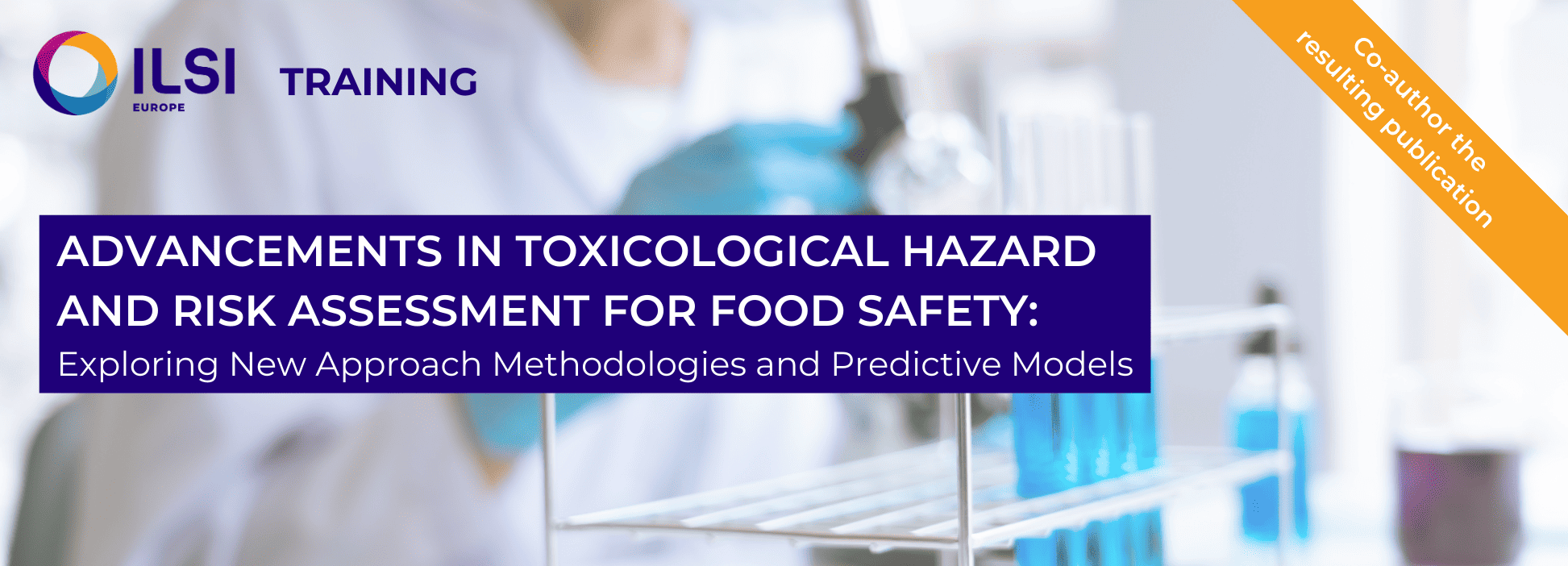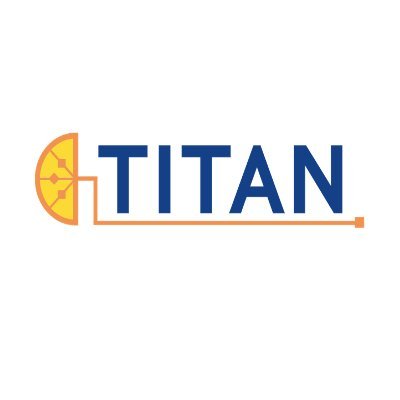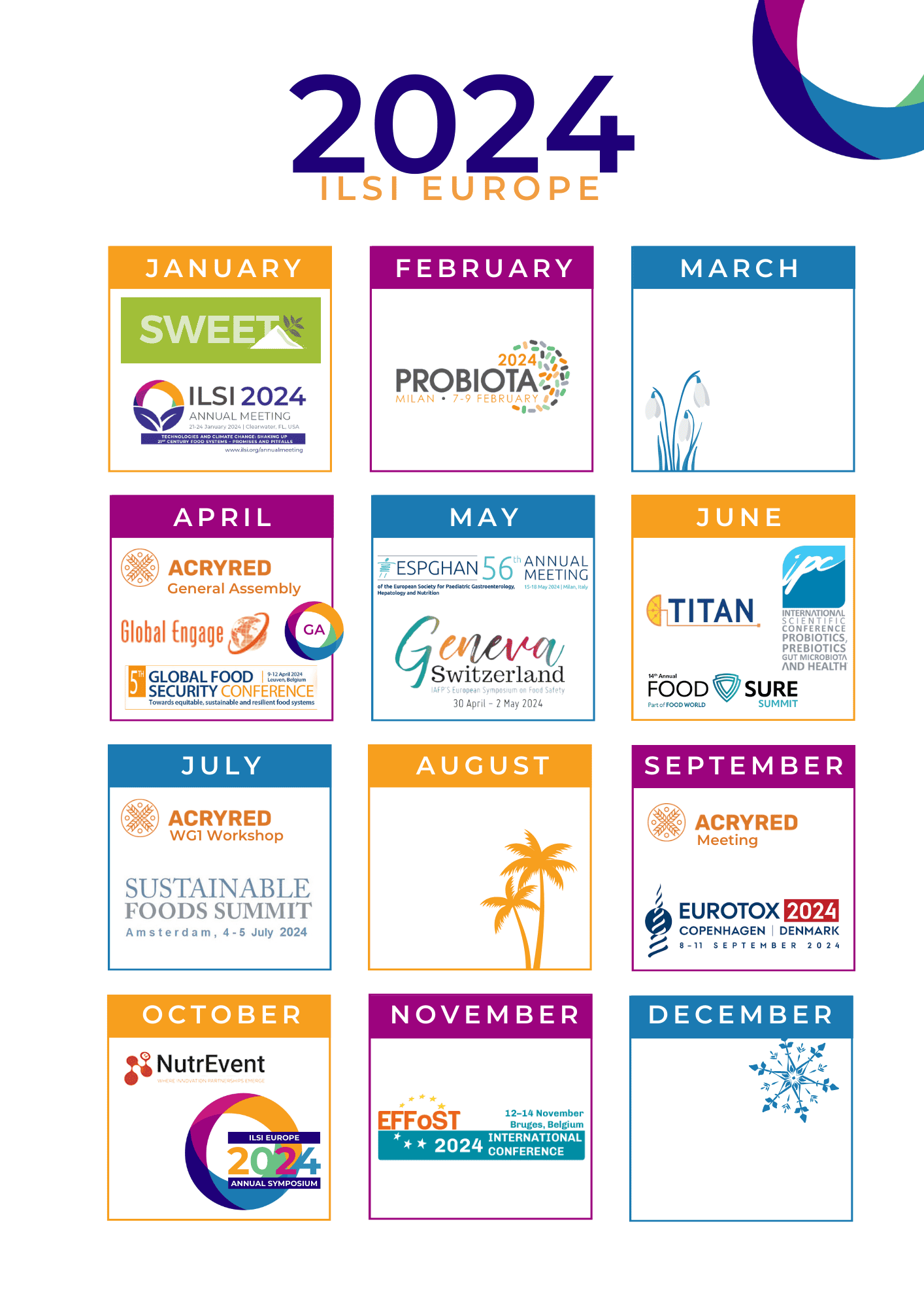The course aims at providing state-of-the-art knowledge on the recent developments in toxicological hazard and risk assessment, with an emphasis on the application in food safety.
The course aims at providing state-of-the-art knowledge on the recent developments in toxicological hazard and risk assessment, with an emphasis on the application in food safety.
02/07/2024 – 03/07/2024
Brussels, Belgium
The course aims at providing state-of-the-art knowledge on the recent developments in toxicological hazard and risk assessment, with an emphasis on the application in food safety.
29/08/2024 – 28/08/2024
online, Zoom
The course aims at providing state-of-the-art knowledge on the recent developments in toxicological hazard and risk assessment, with an emphasis on the application in food safety.
26/06/2024 – 27/06/2024
To be confirmed, Portugal
WP_Query Object
(
[query] => Array
(
[post_type] => event
[posts_per_page] => 5
[type] =>
[area] =>
[before] =>
[after] =>
[tags] =>
[showtitle] =>
[meta_query] => Array
(
[relation] => AND
[0] => Array
(
[key] => _ilsi_date
[value] => 2024-04-18
[compare] => >=
)
)
[paged] => 1
[orderby] => title
[order] => DESC
)
[query_vars] => Array
(
[post_type] => event
[posts_per_page] => 5
[type] =>
[area] =>
[before] =>
[after] =>
[tags] =>
[showtitle] =>
[meta_query] => Array
(
[relation] => AND
[0] => Array
(
[key] => _ilsi_date
[value] => 2024-04-18
[compare] => >=
)
)
[paged] => 1
[orderby] => title
[order] => DESC
[error] =>
[m] =>
[p] => 0
[post_parent] =>
[subpost] =>
[subpost_id] =>
[attachment] =>
[attachment_id] => 0
[name] =>
[pagename] =>
[page_id] => 0
[second] =>
[minute] =>
[hour] =>
[day] => 0
[monthnum] => 0
[year] => 0
[w] => 0
[category_name] =>
[tag] =>
[cat] =>
[tag_id] =>
[author] =>
[author_name] =>
[feed] =>
[tb] =>
[meta_key] =>
[meta_value] =>
[preview] =>
[s] =>
[sentence] =>
[title] =>
[fields] =>
[menu_order] =>
=>
[category__in] => Array
(
)
[category__not_in] => Array
(
)
[category__and] => Array
(
)
[post__in] => Array
(
)
[post__not_in] => Array
(
)
[post_name__in] => Array
(
)
[tag__in] => Array
(
)
[tag__not_in] => Array
(
)
[tag__and] => Array
(
)
[tag_slug__in] => Array
(
)
[tag_slug__and] => Array
(
)
[post_parent__in] => Array
(
)
[post_parent__not_in] => Array
(
)
[author__in] => Array
(
)
[author__not_in] => Array
(
)
[search_columns] => Array
(
)
[ignore_sticky_posts] =>
[suppress_filters] =>
[cache_results] => 1
[update_post_term_cache] => 1
[update_menu_item_cache] =>
[lazy_load_term_meta] => 1
[update_post_meta_cache] => 1
[nopaging] =>
[comments_per_page] => 50
[no_found_rows] =>
)
[tax_query] => WP_Tax_Query Object
(
[queries] => Array
(
)
[relation] => AND
[table_aliases:protected] => Array
(
)
[queried_terms] => Array
(
)
[primary_table] => wp_3_posts
[primary_id_column] => ID
)
[meta_query] => WP_Meta_Query Object
(
[queries] => Array
(
[0] => Array
(
[key] => _ilsi_date
[value] => 2024-04-18
[compare] => >=
)
[relation] => OR
)
[relation] => AND
[meta_table] => wp_3_postmeta
[meta_id_column] => post_id
[primary_table] => wp_3_posts
[primary_id_column] => ID
[table_aliases:protected] => Array
(
[0] => wp_3_postmeta
)
[clauses:protected] => Array
(
[wp_3_postmeta] => Array
(
[key] => _ilsi_date
[value] => 2024-04-18
[compare] => >=
[compare_key] => =
[alias] => wp_3_postmeta
[cast] => CHAR
)
)
[has_or_relation:protected] =>
)
[date_query] =>
[request] =>
SELECT SQL_CALC_FOUND_ROWS wp_3_posts.ID
FROM wp_3_posts INNER JOIN wp_3_postmeta ON ( wp_3_posts.ID = wp_3_postmeta.post_id )
WHERE 1=1 AND (
( wp_3_postmeta.meta_key = '_ilsi_date' AND wp_3_postmeta.meta_value >= '2024-04-18' )
) AND ((wp_3_posts.post_type = 'event' AND (wp_3_posts.post_status = 'publish' OR wp_3_posts.post_status = 'acf-disabled')))
GROUP BY wp_3_posts.ID
ORDER BY wp_3_posts.post_title DESC
LIMIT 0, 5
[posts] => Array
(
[0] => WP_Post Object
(
[ID] => 14210
[post_author] => 355
[post_date] => 2024-02-14 13:13:47
[post_date_gmt] => 2024-02-14 13:13:47
[post_content] =>

The course aims at providing state-of-the-art knowledge on the recent developments in toxicological hazard and risk assessment, with an emphasis on the application in food safety. A limited number of lectures will provide insights in these developments, emphasizing the role of so-called New Approach Methodologies (NAMs).
Webinar 2 content
- Lecture 1: Cytotoxicity and adverse outcome pathways
- Lecture 2: Exposure, Kinetics
- Lecture 3: In Vitro / In Vivo extrapolation for risk- and safety evaluation
- Lecture 4: Preparation for training/compounds
The full training includes:
- Two online webinars on 28 May 2024 (2pm-4pm) and 30 May 2024 (2pm-4pm).
- Two days of in-person training at ILSI Europe's office in Brussels on 2 & 3 July 2024 (full day).
- A follow up online call on 29 August 2024 (2pm-4pm).
More information on the course
Register for the course
[post_title] => Training on New Approach Methodologies: webinar 2
[post_excerpt] =>
[post_status] => publish
[comment_status] => closed
[ping_status] => closed
[post_password] =>
[post_name] => training-on-new-approach-methodologies-webinar-2
[to_ping] =>
[pinged] =>
[post_modified] => 2024-02-14 15:30:53
[post_modified_gmt] => 2024-02-14 15:30:53
[post_content_filtered] =>
[post_parent] => 0
[guid] => https://ilsi.eu/?post_type=event&p=14210
[menu_order] => 0
[post_type] => event
[post_mime_type] =>
[comment_count] => 0
[filter] => raw
)
[1] => WP_Post Object
(
[ID] => 14209
[post_author] => 355
[post_date] => 2024-02-14 13:12:35
[post_date_gmt] => 2024-02-14 13:12:35
[post_content] =>


The course aims at providing state-of-the-art knowledge on the recent developments in toxicological hazard and risk assessment, with an emphasis on the application in food safety. A limited number of lectures will provide insights in these developments, emphasizing the role of so-called New Approach Methodologies (NAMs).
Webinar 1 content
- Introduction to ILSI Europe
- Lecture 1: Objectives of the training
- Lecture 2: Current procedures for food safety assesment
- Lecture 3: A new framework for assessments
The full training includes:
- Two online webinars on 28 May 2024 (2pm-4pm) and 30 May 2024 (2pm-4pm).
- Two days of in-person training at ILSI Europe's office in Brussels on 2 & 3 July 2024 (full day).
- A follow up online call on 29 August 2024 (2pm-4pm).
More information on the course
Register for the course
[post_title] => Training on New Approach Methodologies: webinar 1
[post_excerpt] =>
[post_status] => publish
[comment_status] => closed
[ping_status] => closed
[post_password] =>
[post_name] => training-on-new-approach-methodologies-webinar-1
[to_ping] =>
[pinged] =>
[post_modified] => 2024-02-14 15:23:26
[post_modified_gmt] => 2024-02-14 15:23:26
[post_content_filtered] =>
[post_parent] => 0
[guid] => https://ilsi.eu/?post_type=event&p=14209
[menu_order] => 0
[post_type] => event
[post_mime_type] =>
[comment_count] => 0
[filter] => raw
)
[2] => WP_Post Object
(
[ID] => 14211
[post_author] => 355
[post_date] => 2024-02-14 13:35:52
[post_date_gmt] => 2024-02-14 13:35:52
[post_content] =>

The course aims at providing state-of-the-art knowledge on the recent developments in toxicological hazard and risk assessment, with an emphasis on the application in food safety. A limited number of lectures will provide insights in these developments, emphasizing the role of so-called New Approach Methodologies (NAMs).
In-person training days content
During the 2-day in-person training, a manuscript will be drafted to publish the results of the case studies; participants will have the option to be co-authors of this publication.
The full training includes:
- Two online webinars on 28 May 2024 (2pm-4pm) and 30 May 2024 (2pm-4pm).
- Two days of in-person training at ILSI Europe's office in Brussels on 2 & 3 July 2024 (full day).
- A follow up online call on 29 August 2024 (2pm-4pm).
More information on the course
Register for the course
[post_title] => Training on New Approach Methodologies: in-person training
[post_excerpt] =>
[post_status] => publish
[comment_status] => closed
[ping_status] => closed
[post_password] =>
[post_name] => training-on-new-approach-methodologies-in-person-training
[to_ping] =>
[pinged] =>
[post_modified] => 2024-02-14 14:20:01
[post_modified_gmt] => 2024-02-14 14:20:01
[post_content_filtered] =>
[post_parent] => 0
[guid] => https://ilsi.eu/?post_type=event&p=14211
[menu_order] => 0
[post_type] => event
[post_mime_type] =>
[comment_count] => 0
[filter] => raw
)
[3] => WP_Post Object
(
[ID] => 14212
[post_author] => 355
[post_date] => 2024-02-14 13:41:41
[post_date_gmt] => 2024-02-14 13:41:41
[post_content] =>

The course aims at providing state-of-the-art knowledge on the recent developments in toxicological hazard and risk assessment, with an emphasis on the application in food safety. A limited number of lectures will provide insights in these developments, emphasizing the role of so-called New Approach Methodologies (NAMs).
Follow-up call
During the 2-day in-person training in July, a manuscript will be drafted to publish the results of the case studies; participants will have the option to be co-authors of this publication. The follow-up call will aim to finalise the manuscript.
The full training includes:
- Two online webinars on 28 May 2024 (2pm-4pm) and 30 May 2024 (2pm-4pm).
- Two days of in-person training at ILSI Europe's office in Brussels on 2 & 3 July 2024 (full day).
- A follow up online call on 29 August 2024 (2pm-4pm).
More information on the course
Register for the course
[post_title] => Training on New Approach Methodologies: follow-up call
[post_excerpt] =>
[post_status] => publish
[comment_status] => closed
[ping_status] => closed
[post_password] =>
[post_name] => training-on-new-approach-methodologies-in-person-follow-up
[to_ping] =>
[pinged] =>
[post_modified] => 2024-02-14 14:20:44
[post_modified_gmt] => 2024-02-14 14:20:44
[post_content_filtered] =>
[post_parent] => 0
[guid] => https://ilsi.eu/?post_type=event&p=14212
[menu_order] => 0
[post_type] => event
[post_mime_type] =>
[comment_count] => 0
[filter] => raw
)
[4] => WP_Post Object
(
[ID] => 14164
[post_author] => 351
[post_date] => 2024-02-02 15:24:19
[post_date_gmt] => 2024-02-02 15:24:19
[post_content] =>

About the event
Coming soon!
Further information
Website
[post_title] => TITAN Consortium Meeting
[post_excerpt] =>
[post_status] => publish
[comment_status] => closed
[ping_status] => closed
[post_password] =>
[post_name] => titan-consortium-meeting
[to_ping] =>
[pinged] =>
[post_modified] => 2024-02-02 15:24:19
[post_modified_gmt] => 2024-02-02 15:24:19
[post_content_filtered] =>
[post_parent] => 0
[guid] => https://ilsi.eu/?post_type=event&p=14164
[menu_order] => 0
[post_type] => event
[post_mime_type] =>
[comment_count] => 0
[filter] => raw
)
)
[post_count] => 5
[current_post] => -1
[before_loop] =>
[in_the_loop] =>
[post] => WP_Post Object
(
[ID] => 14210
[post_author] => 355
[post_date] => 2024-02-14 13:13:47
[post_date_gmt] => 2024-02-14 13:13:47
[post_content] =>

The course aims at providing state-of-the-art knowledge on the recent developments in toxicological hazard and risk assessment, with an emphasis on the application in food safety. A limited number of lectures will provide insights in these developments, emphasizing the role of so-called New Approach Methodologies (NAMs).
Webinar 2 content
- Lecture 1: Cytotoxicity and adverse outcome pathways
- Lecture 2: Exposure, Kinetics
- Lecture 3: In Vitro / In Vivo extrapolation for risk- and safety evaluation
- Lecture 4: Preparation for training/compounds
The full training includes:
- Two online webinars on 28 May 2024 (2pm-4pm) and 30 May 2024 (2pm-4pm).
- Two days of in-person training at ILSI Europe's office in Brussels on 2 & 3 July 2024 (full day).
- A follow up online call on 29 August 2024 (2pm-4pm).
More information on the course
Register for the course
[post_title] => Training on New Approach Methodologies: webinar 2
[post_excerpt] =>
[post_status] => publish
[comment_status] => closed
[ping_status] => closed
[post_password] =>
[post_name] => training-on-new-approach-methodologies-webinar-2
[to_ping] =>
[pinged] =>
[post_modified] => 2024-02-14 15:30:53
[post_modified_gmt] => 2024-02-14 15:30:53
[post_content_filtered] =>
[post_parent] => 0
[guid] => https://ilsi.eu/?post_type=event&p=14210
[menu_order] => 0
[post_type] => event
[post_mime_type] =>
[comment_count] => 0
[filter] => raw
)
[comment_count] => 0
[current_comment] => -1
[found_posts] => 18
[max_num_pages] => 4
[max_num_comment_pages] => 0
[is_single] =>
[is_preview] =>
[is_page] =>
[is_archive] =>
[is_date] =>
[is_year] =>
[is_month] =>
[is_day] =>
[is_time] =>
[is_author] =>
[is_category] =>
[is_tag] =>
[is_tax] =>
[is_search] =>
[is_feed] =>
[is_comment_feed] =>
[is_trackback] =>
[is_home] => 1
[is_privacy_policy] =>
[is_404] =>
[is_embed] =>
[is_paged] =>
[is_admin] =>
[is_attachment] =>
[is_singular] =>
[is_robots] =>
[is_favicon] =>
[is_posts_page] =>
[is_post_type_archive] =>
[query_vars_hash:WP_Query:private] => 66a8cf335cd4d7aa322efb65ea7ceae9
[query_vars_changed:WP_Query:private] =>
[thumbnails_cached] =>
[allow_query_attachment_by_filename:protected] =>
[stopwords:WP_Query:private] =>
[compat_fields:WP_Query:private] => Array
(
[0] => query_vars_hash
[1] => query_vars_changed
)
[compat_methods:WP_Query:private] => Array
(
[0] => init_query_flags
[1] => parse_tax_query
)
)






